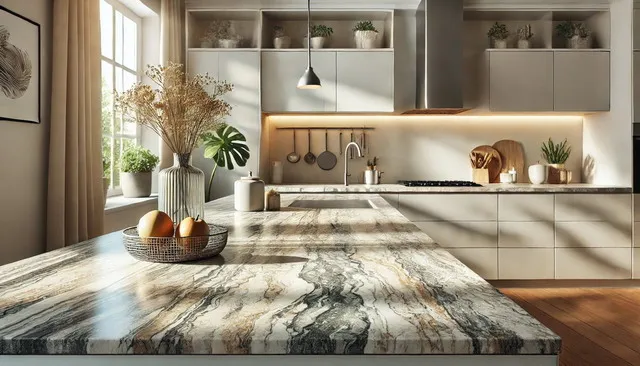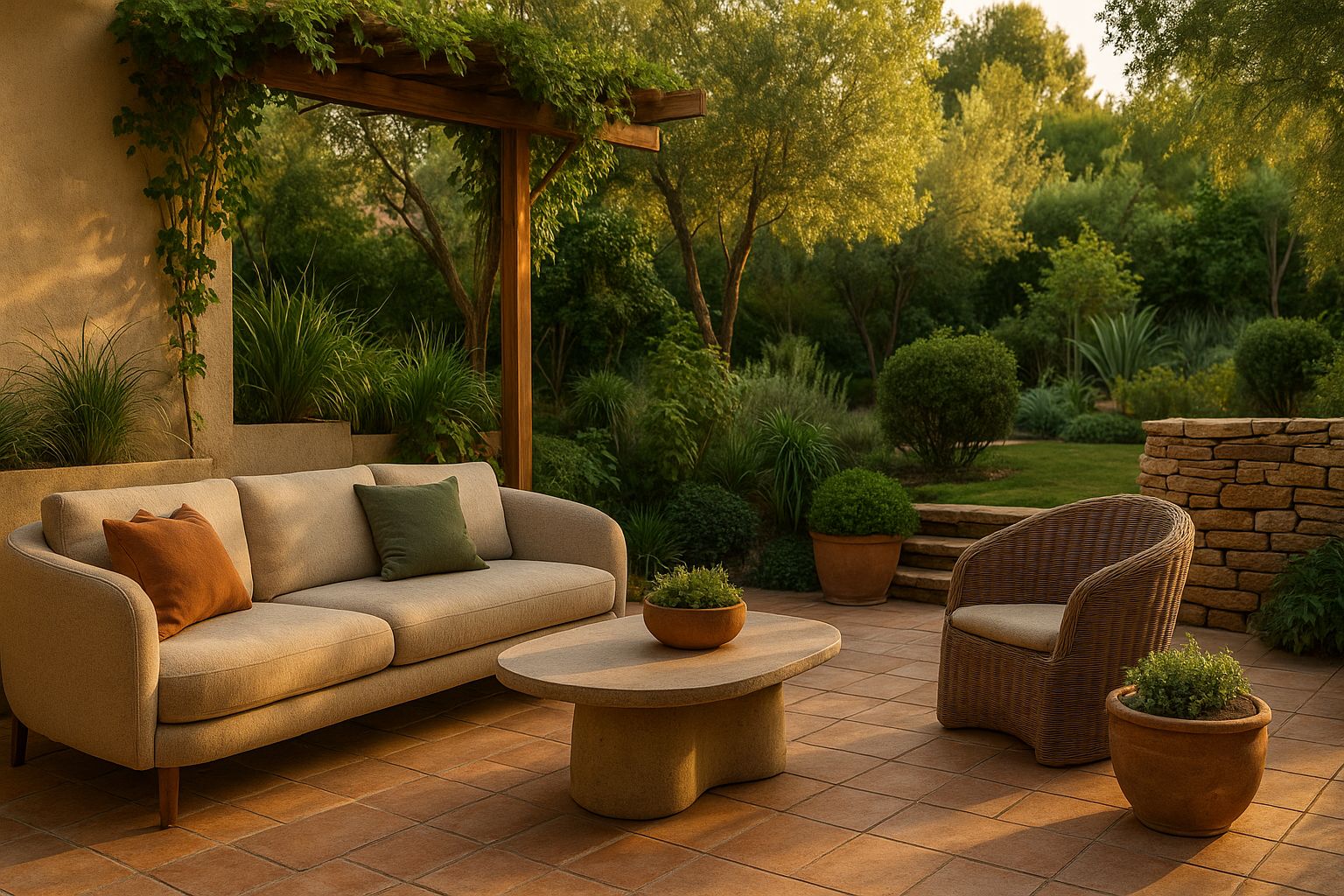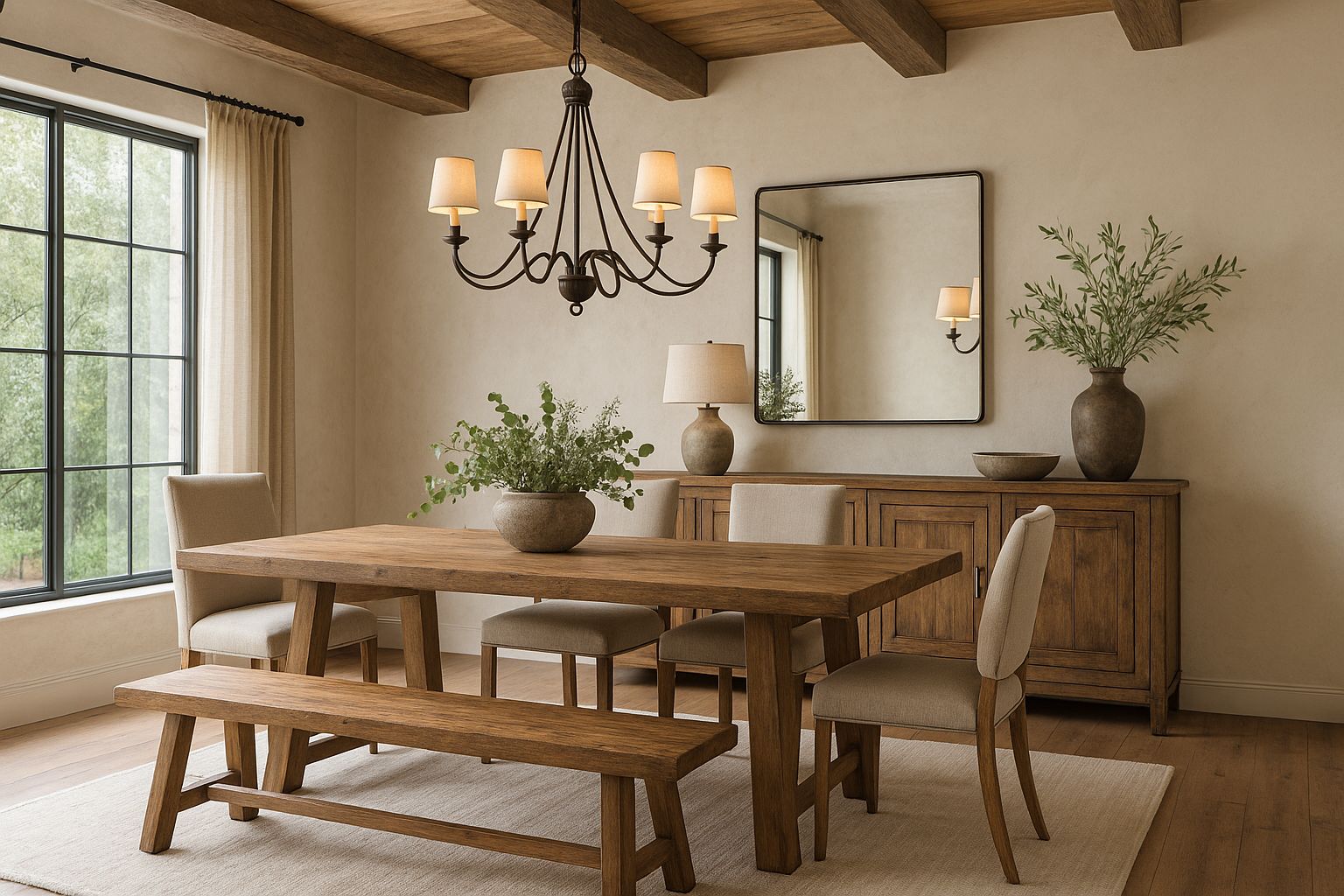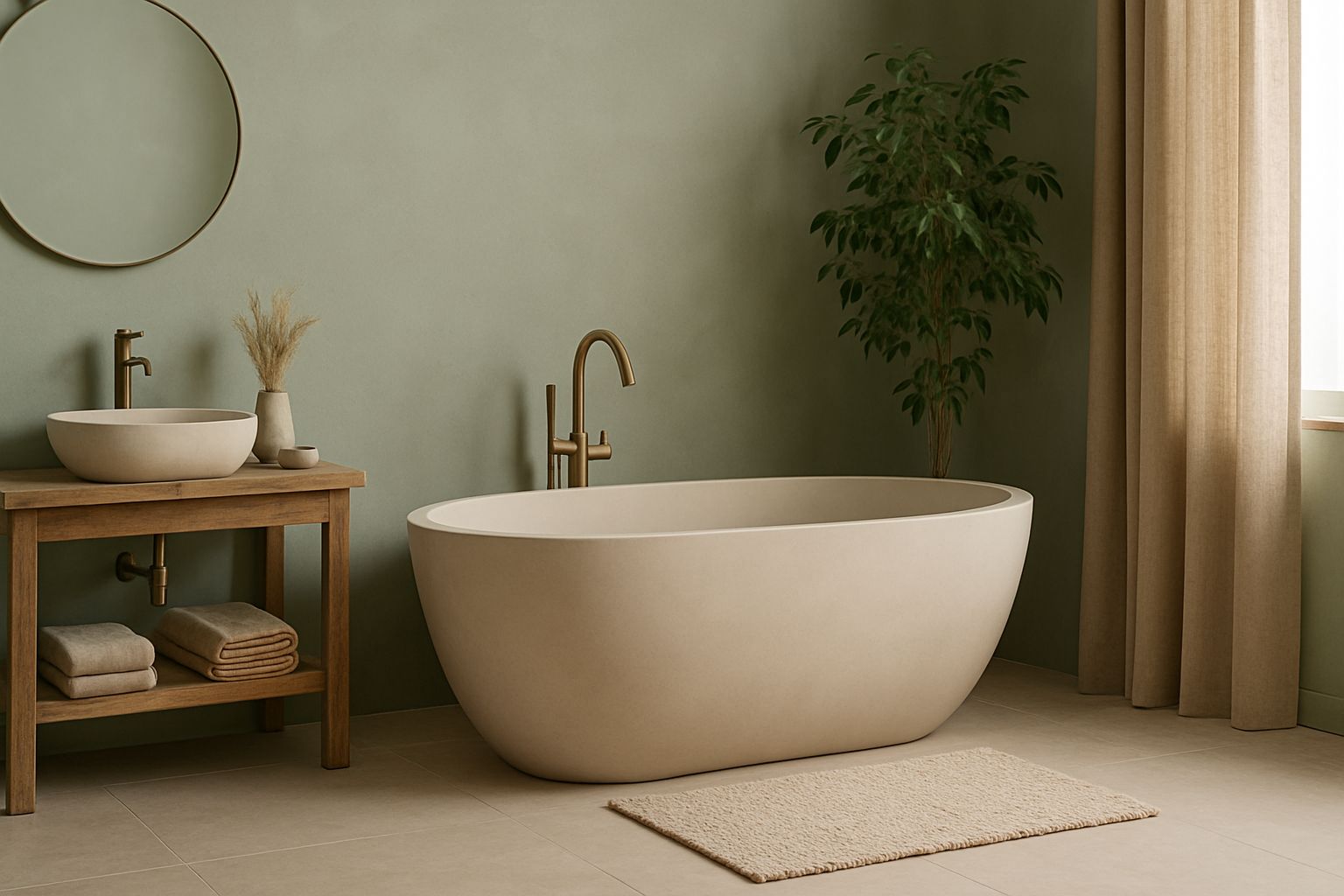As we look toward 2025, sustainability is more than just a passing trend—it’s a guiding principle shaping how we live, build, and design. In the realm of home renovation, this shift is especially visible in the kitchen, the heart of the home. Homeowners are increasingly seeking ways to reduce their environmental footprint, and one of the most impactful areas to make a change is through sustainable kitchen countertops.
Traditionally, materials like granite, marble, and laminate have dominated kitchen design. While visually stunning, these materials come at a cost to the environment due to energy-intensive production processes, resource depletion, and waste generation. In contrast, sustainable countertops made from eco-friendly materials like recycled glass, bamboo, and reclaimed wood offer a greener solution without compromising style or durability.
But why are sustainable kitchen countertops gaining such momentum in 2025? It’s not just about environmental consciousness; it’s about creating healthier homes and more cost-effective, long-lasting designs. As homeowners seek to align their living spaces with their values, the demand for eco-friendly, durable, and beautiful kitchen countertops has surged.
In this article, we’ll explore the top sustainable countertop options trending in 2025, examining their benefits, durability, and design appeal. Whether you’re planning a full kitchen remodel or simply looking to make more conscious choices, this guide will help you navigate the world of sustainable kitchen countertops and make informed decisions that benefit both your home and the planet.
The Rise of Sustainable Kitchen Countertops in 2025
In 2025, sustainability is no longer a buzzword but a movement shaping every aspect of modern living. From energy-efficient appliances to eco-friendly architecture, homeowners are embracing designs that prioritize the environment. One area where this transformation is making a significant impact is in the kitchen—the heart of the home. Central to this evolution is the rise of sustainable kitchen countertops, a trend that’s not only shaping aesthetic preferences but also fostering environmental consciousness.
The kitchen is often seen as the most utilized space in a home, and it’s where many families spend quality time cooking, dining, and gathering. This makes the materials and design choices for kitchen renovations more critical than ever. Countertops, as one of the kitchen’s most prominent features, play a major role in defining its look and functionality. As we move into 2025, the demand for countertops made from sustainable, eco-friendly materials is skyrocketing.
Why the Shift Towards Sustainability?
The world is facing an environmental crisis, with climate change, deforestation, and pollution at the forefront of global concerns. Homeowners are becoming increasingly aware of how their choices impact the environment, and sustainable kitchen countertops offer a practical way to contribute to a greener planet. The use of non-renewable resources like granite and marble has raised concerns about the depletion of natural resources and the energy-intensive processes involved in their extraction and production. On the other hand, sustainable materials, like recycled glass, bamboo, and reclaimed wood, provide an eco-friendly alternative that reduces waste and carbon footprints.
But the move towards sustainability is not just about reducing environmental harm—it’s also about creating healthier homes. Many traditional countertop materials can emit harmful volatile organic compounds (VOCs), which degrade indoor air quality. Sustainable countertops, made from natural or recycled materials, are often free from toxic chemicals, making them a healthier option for families. This is one reason why sustainable countertops are becoming an essential choice for homeowners who value both environmental and personal well-being.
Design Trends Leading the Charge
The rise of sustainable kitchen countertops in 2025 isn’t just about being environmentally responsible; it’s about embracing innovative designs that merge functionality with beauty. Designers are finding new ways to transform eco-friendly materials into stunning kitchen masterpieces. Countertops made from recycled materials like glass or paper composite are gaining popularity for their modern, sleek appearance, while reclaimed wood and bamboo offer a more rustic, natural aesthetic.
This shift towards sustainable materials is also driven by a change in consumer values. Today’s homeowners are more focused on making conscious decisions that reflect their commitment to sustainability, both in their personal lives and in their homes. These eco-friendly countertops are not only durable and functional but also serve as a statement piece, reflecting the homeowner’s dedication to a greener lifestyle.
What Are the Best Eco-Friendly Countertop Materials for Kitchens?
As homeowners look for sustainable kitchen solutions, they’re faced with a growing variety of eco-friendly countertop materials. Choosing the right one depends on factors such as durability, maintenance, aesthetic appeal, and the specific environmental impact of the material. In 2025, several materials stand out as top choices for sustainable kitchen countertops.
Recycled Glass Countertops
Recycled glass countertops are becoming a go-to option for eco-conscious homeowners. These countertops are made by combining crushed glass with resin or concrete to create a solid, durable surface. The glass used in these countertops comes from post-consumer waste, such as bottles and windows, making it an excellent way to divert glass from landfills. The beauty of recycled glass countertops lies in their versatility—they can be made in a wide range of colors and patterns, allowing for unique, customizable designs.
Not only are recycled glass countertops eco-friendly, but they’re also low-maintenance and resistant to heat and stains, making them ideal for busy kitchens. Additionally, they contribute to a sleek, contemporary look that appeals to modern design sensibilities. For those who want a pop of color or a distinctive style, recycled glass is an excellent choice.
Bamboo Countertops
Bamboo is another sustainable material that is taking center stage in kitchen design. Known for its rapid growth and renewability, bamboo is often touted as a “green” alternative to wood. Bamboo countertops offer a natural, organic look that complements a variety of kitchen styles, from minimalist to rustic. What makes bamboo particularly appealing is its sustainability—because bamboo grows so quickly, it can be harvested without causing long-term damage to the environment.
In terms of functionality, bamboo is durable and lightweight. It’s also naturally resistant to water, making it a practical choice for kitchen countertops. However, bamboo does require regular maintenance, such as sealing, to prevent damage from prolonged moisture exposure. Despite this, its eco-friendly credentials make it a top contender for sustainable kitchen renovations.
Reclaimed Wood Countertops
For homeowners looking for a rustic, vintage feel, reclaimed wood countertops are a beautiful and sustainable option. Reclaimed wood is sourced from old buildings, barns, or even shipping pallets, giving the material a second life. By using reclaimed wood, homeowners not only prevent deforestation but also reduce the demand for newly harvested timber. Each piece of reclaimed wood has its own history and character, resulting in countertops that are one-of-a-kind.
Reclaimed wood countertops bring warmth and texture to a kitchen, making them a popular choice for those who want to create a cozy, inviting atmosphere. However, like bamboo, wood countertops require proper sealing to protect them from water damage. With the right care, reclaimed wood countertops can be a durable and environmentally-friendly option for a sustainable kitchen.
Composite Paper Countertops
One of the newer materials on the market, composite paper countertops are made from recycled paper and non-petroleum-based resins. This material is surprisingly strong, heat-resistant, and available in a variety of colors and textures. The process of creating composite paper countertops uses significantly less energy than traditional materials like granite or quartz, further adding to its sustainability appeal.
Composite paper countertops are lightweight and easy to install, making them a practical choice for eco-friendly kitchen renovations. They offer a sleek, modern look, and their smooth surface makes them easy to clean and maintain. For homeowners who want a sustainable, yet modern option, composite paper countertops are a great choice.
The Future of Recycled Glass Countertops in 2025
As sustainability becomes more central to kitchen design, recycled glass countertops are poised to become a standout choice in 2025. This eco-friendly option is not only appealing for its green credentials but also for its modern aesthetic. Made from post-consumer and post-industrial glass, these countertops provide a creative solution for reducing waste while adding a stylish touch to kitchens.
Aesthetics and Versatility
One of the major reasons for the growing popularity of recycled glass countertops is their visual appeal. These countertops are available in a vast array of colors, patterns, and textures, allowing homeowners to create a truly unique kitchen design. Whether you prefer a sleek, modern look with clean lines or a more eclectic vibe with bold colors and intricate patterns, recycled glass offers a level of customization that few other materials can match.
The glass fragments used in these countertops can range from finely crushed pieces to larger chunks, creating different visual effects. In 2025, we expect to see more innovative designs that combine recycled glass with other materials, such as resin or concrete, to create even more striking combinations. This ability to experiment with color and texture means that recycled glass countertops can be tailored to suit any kitchen style, from ultra-modern to rustic chic.
Durability and Maintenance
In addition to their aesthetic advantages, recycled glass countertops are durable and long-lasting. The materials used in their production—especially when combined with concrete or resin—are strong enough to withstand daily kitchen use. They are heat-resistant, scratch-resistant, and easy to clean, making them a practical choice for busy households.
However, like all countertops, proper care is required to maintain their beauty. While recycled glass countertops are resistant to stains and heat, they can be prone to chipping if heavy objects are dropped on them. Regular sealing is recommended to protect the surface and ensure its longevity.
Environmental Impact
From an environmental perspective, recycled glass countertops are an excellent choice for eco-conscious homeowners. By using post-consumer glass, these countertops help divert waste from landfills, significantly reducing the environmental impact associated with glass production. Additionally, the manufacturing process of recycled glass countertops consumes less energy compared to traditional countertop materials like granite or marble, further lowering their carbon footprint.
As we move towards a future where sustainability is increasingly prioritized, recycled glass countertops will continue to be a popular option for homeowners looking to make environmentally responsible choices without sacrificing style or durability.
How Bamboo Countertops Are Redefining Kitchen Sustainability
Bamboo is one of the fastest-growing plants in the world, making it an incredibly renewable resource. In 2025, bamboo countertops are gaining traction as a sustainable kitchen material, combining beauty, strength, and eco-friendliness. These countertops are ideal for homeowners who want a natural, organic feel in their kitchen while staying committed to environmental sustainability.
Bamboo: The Renewable Resource
One of the main advantages of bamboo countertops is the plant’s rapid growth rate. Unlike hardwood trees, which can take decades to mature, bamboo can be harvested every three to five years without causing long-term environmental damage. This makes bamboo one of the most sustainable materials available for countertops, as its use helps to reduce deforestation and preserve natural ecosystems.
Bamboo countertops also have a lower environmental impact in terms of carbon emissions. The manufacturing process for bamboo requires less energy than other countertop materials, and bamboo plants absorb large amounts of carbon dioxide during their growth, further contributing to their green credentials.
Durability and Practicality
In terms of functionality, bamboo is surprisingly strong. Although it is technically a grass, bamboo has a hardness comparable to that of many hardwoods, making it a durable option for kitchen countertops. Bamboo countertops can withstand daily use, are resistant to scratching, and are easy to maintain. A simple cleaning routine with mild soap and water is sufficient to keep bamboo countertops looking new.
However, bamboo countertops do require regular sealing to protect them from moisture and prevent staining. Because bamboo is a natural material, it is more susceptible to water damage than other countertop options like quartz or recycled glass. With the right care, though, bamboo countertops can last for many years while maintaining their beauty.
Aesthetic Appeal
Bamboo countertops offer a clean, minimalist look that fits well in modern kitchens. The natural grain of bamboo adds warmth and texture, creating a sense of calm and organic flow. As homeowners in 2025 increasingly seek to create spaces that promote well-being and sustainability, bamboo countertops are becoming a top choice for those who want to combine eco-consciousness with contemporary style.
For homeowners looking for a sustainable material that delivers both visual appeal and durability, bamboo countertops are an excellent investment. They provide a natural, renewable alternative to traditional wood or stone countertops, making them a key player in the future of sustainable kitchen design.
Top Low-Maintenance Sustainable Countertop Options for Modern Kitchens
As homeowners embrace sustainability, they also prioritize low-maintenance materials that make everyday life easier. In 2025, the demand for countertops that combine eco-friendliness with minimal upkeep is growing rapidly. Homeowners are looking for materials that not only reduce their environmental impact but also simplify their cleaning routines and reduce the need for constant maintenance.
Quartz: The Durable Eco-Friendly Choice
Quartz has become one of the most popular low-maintenance countertop options for modern kitchens, and its sustainable variants are making waves in 2025. While quartz is not a naturally renewable resource, many manufacturers are producing eco-friendly quartz countertops made from recycled materials, reducing the environmental impact associated with mining and processing.
Quartz countertops are known for their durability, resistance to scratches, and non-porous surface, making them an ideal choice for homeowners who want a low-maintenance option. They require no sealing, are resistant to stains, and can be cleaned with just mild soap and water. With their sleek appearance and long-lasting qualities, quartz countertops are a sustainable yet practical option for busy households.
Stainless Steel Countertops: A Sustainable and Hygienic Solution
Stainless steel countertops have been popular in commercial kitchens for years, and they are now finding their way into more homes, particularly among homeowners seeking a low-maintenance, sustainable option. Made from recycled materials, stainless steel countertops are highly durable and can withstand high heat and heavy use, making them an ideal choice for eco-conscious families who spend a lot of time in the kitchen.
In addition to their durability, stainless steel countertops are incredibly hygienic, as their non-porous surface does not harbor bacteria or mold. They are easy to clean and maintain, requiring only regular wiping with a damp cloth. In 2025, stainless steel countertops are gaining popularity for their industrial-chic aesthetic and their ability to meet both sustainability and practicality goals.
Eco-Friendly Composite Countertops
Composite countertops made from recycled materials, such as paper, resin, or other post-consumer products, are another top choice for low-maintenance sustainable kitchens. These countertops are lightweight, durable, and resistant to stains and scratches, making them perfect for homeowners who want a hassle-free option.
The sustainability of composite countertops lies in their use of recycled content, as well as the energy-efficient manufacturing processes employed by eco-friendly brands. In 2025, homeowners are increasingly turning to composite countertops for their modern look, environmental benefits, and low-maintenance qualities.
Are Concrete Countertops Still Sustainable in 2025?
Concrete countertops have been a popular choice for those looking to achieve an industrial or minimalist aesthetic in their kitchens. In 2025, however, questions around the sustainability of concrete continue to arise. While concrete is known for its durability and customizability, it’s also associated with high carbon emissions due to the energy-intensive process of producing cement, a key component of concrete. So, where do concrete countertops stand in terms of sustainability in 2025?
Advances in Sustainable Concrete Production
Recent innovations have been focused on reducing the environmental impact of concrete production. Manufacturers are increasingly using fly ash (a byproduct of coal combustion) and slag cement (a byproduct of steel production) as substitutes for traditional Portland cement. These alternative materials reduce the overall carbon footprint of concrete countertops by minimizing the need for new raw materials.
In addition, some companies are incorporating recycled aggregates—such as crushed glass, metal shavings, and even reclaimed concrete from demolished buildings—into their countertop products. This not only gives the concrete a unique visual appeal but also helps reduce the waste that would otherwise end up in landfills.
By 2025, concrete countertops are still considered a sustainable option, particularly when produced using these eco-friendly methods. While traditional concrete may have a higher environmental cost, advancements in production techniques have made it possible to enjoy the benefits of concrete countertops without compromising sustainability.
Durability and Longevity
One of the strongest sustainability arguments for concrete countertops is their durability. Concrete is one of the most long-lasting materials available for kitchen surfaces, meaning it doesn’t need to be replaced as often as less durable alternatives. A well-maintained concrete countertop can last for decades, reducing the need for frequent renovations and minimizing the overall environmental impact.
However, concrete countertops do require sealing to prevent staining and water damage. Homeowners should use low-VOC (volatile organic compound) sealants to keep their concrete countertops protected while maintaining a healthy indoor air quality.
The Aesthetic Appeal of Concrete
In terms of design, concrete countertops are highly versatile. They can be customized in terms of color, texture, and finish, allowing homeowners to create a countertop that suits their specific kitchen style. Whether polished to a sleek shine or left with a more rustic, matte finish, concrete offers endless design possibilities. In 2025, concrete countertops continue to be favored by those seeking a modern, industrial-chic look for their kitchens, with a growing emphasis on sustainability.
Reclaimed Wood Countertops: The Ultimate Green Kitchen Solution
As sustainability takes center stage in 2025, reclaimed wood countertops are gaining popularity among eco-conscious homeowners. Reclaimed wood offers a beautiful, rustic look while simultaneously addressing the environmental concerns associated with traditional wood harvesting. By repurposing old wood from barns, factories, and other structures, homeowners can create a kitchen countertop that is not only unique but also deeply sustainable.
The Environmental Benefits of Reclaimed Wood
One of the most significant environmental benefits of using reclaimed wood is that it helps reduce the demand for newly harvested timber. Traditional wood countertops often contribute to deforestation and the loss of natural habitats. In contrast, reclaimed wood countertops give new life to materials that would otherwise be discarded or left to decay.
Moreover, by repurposing old wood, the energy required to process and manufacture new products is significantly reduced. This minimizes the carbon emissions associated with the creation of new countertops, making reclaimed wood an excellent choice for those seeking to reduce their environmental footprint.
Character and History in Every Piece
Reclaimed wood countertops bring a sense of history and character to a kitchen that can’t be replicated by newer materials. Each piece of wood has its own story, with unique grain patterns, weathering, and imperfections that add warmth and charm to a kitchen. Whether sourced from an old barn, a factory floor, or even a vintage ship, reclaimed wood countertops offer a one-of-a-kind aesthetic that brings a sense of authenticity to the home.
In 2025, the trend for reclaimed wood is only growing as homeowners seek to integrate more natural, tactile elements into their kitchens. The rustic, weathered look of reclaimed wood pairs beautifully with both modern and traditional design styles, offering versatility in terms of kitchen aesthetics.
Durability and Care
While reclaimed wood countertops are certainly durable, they do require regular maintenance to keep them in good condition. Wood is a porous material, which means it can be susceptible to stains, scratches, and water damage. To protect the surface, reclaimed wood countertops should be sealed with food-safe, non-toxic sealants that are also eco-friendly.
With proper care, reclaimed wood countertops can last for many years, providing a sustainable and beautiful addition to any kitchen. Their longevity and unique character make them a favorite among homeowners looking to balance sustainability with aesthetics.
Quartz vs. Granite: Which Is the More Sustainable Countertop Material?
When it comes to choosing between quartz and granite countertops, many homeowners face a difficult decision. Both materials are highly durable and offer a luxurious appearance, but which one is more sustainable? In 2025, eco-conscious homeowners are increasingly weighing the environmental impact of these two popular materials before making their choice.
Environmental Impact of Granite
Granite countertops are made from natural stone, which is quarried from the earth. While granite is a durable and long-lasting material, the extraction process has significant environmental consequences. Quarrying granite involves large-scale mining operations that can lead to habitat destruction, soil erosion, and water pollution. The transportation of granite from quarries, which are often located in remote areas, further adds to its carbon footprint.
In terms of sustainability, granite is not a renewable resource. Once it’s extracted from the earth, it takes millions of years to replenish, making it a less sustainable choice compared to other materials.
Quartz: A More Sustainable Alternative?
Quartz countertops, while not entirely natural like granite, are often considered a more sustainable choice. Quartz countertops are engineered from quartz particles and resin, and many manufacturers use recycled materials in their production. This reduces the environmental impact compared to the mining of natural stone.
In addition, the manufacturing process for quartz is less energy-intensive than granite, and the finished product is highly durable, requiring little maintenance. Quartz countertops are also non-porous, meaning they don’t need to be sealed, and they resist staining and bacterial growth, making them an excellent low-maintenance option for homeowners.
However, it’s important to note that some quartz manufacturers still use non-renewable resources in their production, and the resins used in quartz countertops are typically derived from petroleum-based products. For eco-conscious homeowners, selecting quartz brands that prioritize the use of recycled materials and sustainable manufacturing processes is key to ensuring a greener choice.
Durability and Longevity
Both quartz and granite are highly durable materials that can last for decades with proper care. In terms of sustainability, the longevity of a countertop is an important factor to consider—materials that are built to last reduce the need for frequent replacements, ultimately minimizing their environmental impact.
Granite’s natural durability makes it a strong contender for homeowners who want a countertop that will stand the test of time. On the other hand, quartz’s engineered nature allows it to be even more resistant to scratching, staining, and heat than granite, making it a highly durable option.
The Verdict
In 2025, quartz is generally considered the more sustainable option compared to granite, particularly when sourced from manufacturers that prioritize eco-friendly practices. While both materials offer durability and a high-end look, quartz’s ability to incorporate recycled materials and its less environmentally damaging manufacturing process give it the edge in terms of sustainability.
For homeowners looking to make an eco-friendly decision, choosing quartz over granite can help reduce their environmental footprint while still providing a beautiful, durable kitchen countertop.
How to Choose Sustainable Countertops for Small Kitchens
Designing a sustainable kitchen doesn’t require a large space. In fact, homeowners with small kitchens can make just as big an impact by choosing eco-friendly materials that suit their space. When it comes to selecting sustainable countertops for small kitchens, the key is to focus on materials that combine functionality with environmental responsibility.
Maximize Space with Smart Material Choices
In a small kitchen, every square inch counts, and countertop materials need to be both practical and efficient. Sustainable options like bamboo, recycled glass, and composite paper are ideal for compact kitchens due to their durability, low maintenance, and eco-friendly credentials.
For example, recycled glass countertops are perfect for small spaces because they can be custom-made to fit any size or shape. Their reflective surface also helps make small kitchens feel larger and brighter, which is especially important in compact areas with limited natural light. Similarly, composite paper countertops, which are made from recycled paper and non-petroleum-based resins, offer a lightweight and versatile solution for smaller spaces while maintaining a sleek, modern appearance.
Bamboo countertops can also be a great fit for small kitchens, particularly for homeowners who prefer a more natural, organic look. Bamboo’s light color and smooth finish can create an open and airy feel, which is ideal for small spaces.
Customization and Flexibility
In small kitchens, customization is crucial for maximizing countertop space. Fortunately, many sustainable materials like recycled glass and composite paper are highly customizable, allowing homeowners to create countertops that fit their unique dimensions and design preferences. This flexibility makes it easier to create an eco-friendly kitchen without compromising on functionality or style.
Design Tips for a Sustainable, Small-Space Kitchen
To make the most of your sustainable countertops in a small kitchen, consider pairing them with other space-saving design elements. For example, incorporating open shelving or floating countertops can help maximize surface area without making the space feel cluttered. Additionally, choosing lighter colors and reflective surfaces (such as recycled glass) can create the illusion of more space, making your kitchen feel larger than it is.
When combined with thoughtful design and careful material selection, sustainable countertops can transform even the smallest kitchen into a functional, eco-friendly haven.
Is It Worth Investing in Sustainable Kitchen Countertops in 2025?
With so many sustainable countertop options available, many homeowners wonder whether the investment is truly worth it. In 2025, the answer is a resounding yes. Investing in sustainable kitchen countertops offers a range of benefits that go beyond just environmental responsibility. From long-term cost savings to healthier homes, the advantages of choosing eco-friendly materials are clear.
Long-Term Financial Benefits
While sustainable countertops may have a higher upfront cost compared to traditional options, they offer significant long-term financial benefits. Materials like bamboo, quartz, and recycled glass are highly durable, meaning they require fewer repairs and replacements over time. This longevity reduces the need for frequent renovations, saving homeowners money in the long run.
Additionally, sustainable materials can increase the value of your home. As more buyers prioritize eco-friendly living, having sustainable kitchen countertops can make your property more attractive and competitive in the real estate market.
Healthier Homes
One of the biggest advantages of sustainable countertops is the health benefits they offer. Many traditional countertop materials, such as laminate and certain engineered stones, can emit harmful chemicals like volatile organic compounds (VOCs), which degrade indoor air quality. In contrast, eco-friendly countertops made from natural or recycled materials are often free from toxic substances, contributing to a healthier living environment.
For families with young children or individuals with allergies or sensitivities, this can be a major consideration. Materials like bamboo, recycled glass, and composite paper countertops are often non-toxic and low-VOC, making them a safer choice for everyday use.
Environmental Impact
Perhaps the most compelling reason to invest in sustainable countertops is the positive environmental impact. By choosing materials that are renewable, recycled, or sustainably sourced, homeowners can help reduce their carbon footprint and contribute to the global effort to combat climate change. The use of sustainable materials helps preserve natural resources, reduce waste, and minimize the energy required for manufacturing.
In 2025, sustainability is no longer just a trend—it’s a necessity. By investing in eco-friendly kitchen countertops, homeowners can play an active role in protecting the environment for future generations.
Key Takeaways for Homeowners
If you’re considering a kitchen renovation, sustainable countertops are a smart investment for several reasons:
- Durability: Sustainable materials like quartz, bamboo, and recycled glass are built to last, reducing the need for costly replacements.
- Health benefits: Low-VOC and non-toxic countertops contribute to a healthier home environment.
- Environmental responsibility: Choosing eco-friendly materials helps reduce your carbon footprint and supports sustainable manufacturing practices.
- Resale value: Homes with sustainable features, including eco-friendly countertops, are more appealing to buyers and can increase your property’s value.
In conclusion, investing in sustainable kitchen countertops in 2025 is a wise choice for homeowners who want to create a beautiful, functional kitchen while also contributing to a more sustainable future. Whether you’re drawn to the sleek look of recycled glass, the natural warmth of bamboo, or the durability of quartz, there are plenty of options that combine style, practicality, and environmental responsibility.









